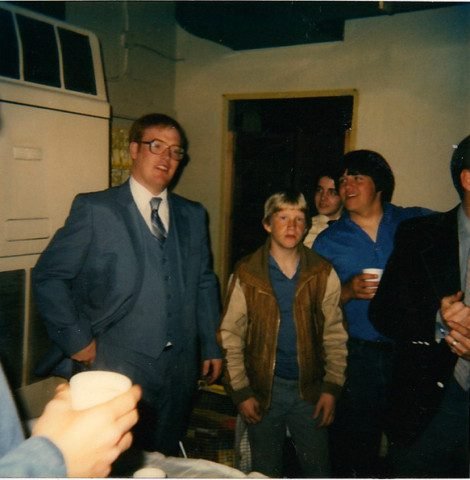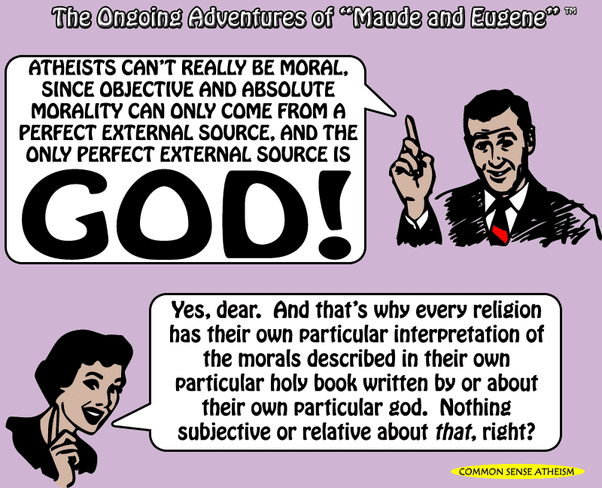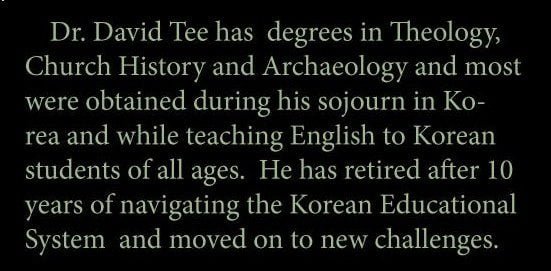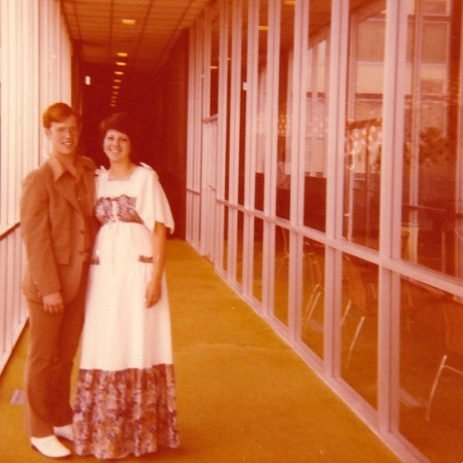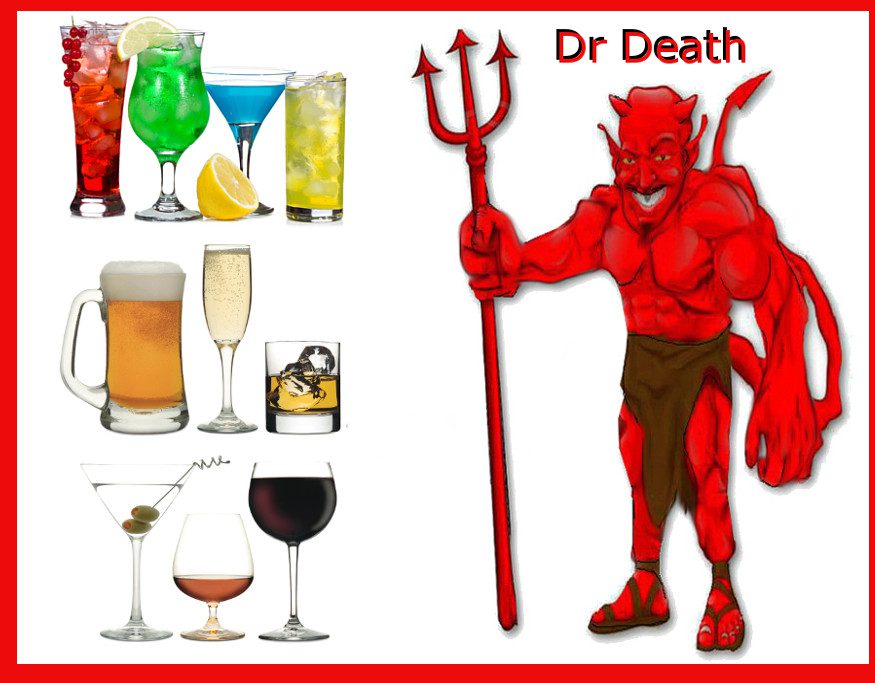
These days, I enjoy drinking an occasional glass of wine, shot of whisky, or a variety of other concoctions containing alcohol. However, enjoying the fruits and grains of God’s Creation® has not always been my habit. Being raised in the Independent Fundamentalist Baptist (IFB) church meant that I heard countless sermons on the evils of alcohol. My parents didn’t drink, and neither did I. I was almost forty-five years old before I drank alcohol, and then I only did it because I thought it might help with my pain. (It didn’t. I quickly learned that I have to drink a lot of alcohol before I feel its effects.) It has only been since I left Christianity that I have felt the freedom to drink alcohol at home and socially.
As a youth, the frequent sermons I heard about the dangers of drinking alcohol made a deep psychological impression on me. How could it not? Week after week, month after month, and year after year, the pastors and youth directors of the churches I attended made sure that congregants knew that drinking alcohol would lead a person straight to Hell. As with many forbidden behaviors, preachers used violent, bloody, extreme stories to illustrate their anti-booze sermons, not-so-subtly reminding us that if we touched one drop of the Devil’s brew, we too could face such calamities and even death.
How did these men of God justify their anti-alcohol crusading on a Biblical basis? The Bible says:
- Wine is a mocker, strong drink is raging: and whosoever is deceived thereby is not wise. (Proverbs 20:1)
- Woe unto them that rise up early in the morning, that they may follow strong drink; that continue until night, till wine inflame them! (Isaiah 5:11)
- Envyings, murders, drunkenness, revellings, and such like: of the which I tell you before, as I have also told you in time past, that they which do such things shall not inherit the kingdom of God. (Galatians 5:21)
- Who hath woe? who hath sorrow? who hath contentions? who hath babbling? who hath wounds without cause? who hath redness of eyes? They that tarry long at the wine; they that go to seek mixed wine. Look not thou upon the wine when it is red, when it giveth his colour in the cup, when it moveth itself aright. At the last it biteth like a serpent, and stingeth like an adder. Thine eyes shall behold strange women, and thine heart shall utter perverse things. Yea, thou shalt be as he that lieth down in the midst of the sea, or as he that lieth upon the top of a mast. They have stricken me, shalt thou say, and I was not sick; they have beaten me, and I felt it not: when shall I awake? I will seek it yet again. (Proverbs 23:29-35)
- It is not for kings, O Lemuel, it is not for kings to drink wine; nor for princes strong drink: Lest they drink, and forget the law, and pervert the judgment of any of the afflicted. (Proverbs 31:4,5)
- But they also have erred through wine, and through strong drink are out of the way; the priest and the prophet have erred through strong drink, they are swallowed up of wine, they are out of the way through strong drink; they err in vision, they stumble in judgment. (Isaiah 28:7)
For much of my life, these verses were sufficient to keep me from drinking alcohol. It wasn’t until the late 1990s that I took another look at what the Bible actually said about alcohol. I found that the preachers of my youth, though well-intentioned, were misusing what the Bible said to advance a moralistic code of conduct. To do so, they only focused on Bible verses that propped up their teetotaling views. I never heard sermons quoting these verses:
- Go thy way, eat thy bread with joy, and drink thy wine with a merry heart; for God now accepteth thy works. (Ecclesiastes 9:7)
- The Lord hath sworn by his right hand, and by the arm of his strength, Surely I will no more give thy corn to be meat for thine enemies; and the sons of the stranger shall not drink thy wine, for the which thou hast laboured: But they that have gathered it shall eat it, and praise the Lord; and they that have brought it together shall drink it in the courts of my holiness. (Isaiah 62:8,9)
- He causeth the grass to grow for the cattle, and herb for the service of man: that he may bring forth food out of the earth; And wine that maketh glad the heart of man, and oil to make his face to shine, and bread which strengtheneth man’s heart. (Psalm 104:14,15)
- Ho, every one that thirsteth, come ye to the waters, and he that hath no money; come ye, buy, and eat; yea, come, buy wine and milk without money and without price. (Isaiah 55:1)
- And thou shalt bestow that money for whatsoever thy soul lusteth after, for oxen, or for sheep, or for wine, or for strong drink, or for whatsoever thy soul desireth: and thou shalt eat there before the Lord thy God, and thou shalt rejoice, thou, and thine household. (Deuteronomy 14:26)
- Give strong drink unto him that is ready to perish, and wine unto those that be of heavy hearts. Let him drink, and forget his poverty, and remember his misery no more. (Proverbs 31:6,7)
As I delved into the meaning of the Hebrew and Greek words used for wine and strong drink, I concluded that it was impossible to support abstinence from alcohol from the Bible. While the Bible clearly condemns drunkenness, it does not forbid drinking alcohol in moderation; moderation being a word rarely used in IFB circles.
The text that finally convinced me that it was okay for people to drink alcohol in moderation was John 2:1-11 — the story where Jesus turned water into wine:
And the third day there was a marriage in Cana of Galilee; and the mother of Jesus was there: And both Jesus was called, and his disciples, to the marriage. And when they wanted wine, the mother of Jesus saith unto him, They have no wine. Jesus saith unto her, Woman, what have I to do with thee? mine hour is not yet come. His mother saith unto the servants, Whatsoever he saith unto you, do it. And there were set there six waterpots of stone, after the manner of the purifying of the Jews, containing two or three firkins apiece. Jesus saith unto them, Fill the waterpots with water. And they filled them up to the brim. And he saith unto them, Draw out now, and bear unto the governor of the feast. And they bare it. When the ruler of the feast had tasted the water that was made wine, and knew not whence it was: (but the servants which drew the water knew;) the governor of the feast called the bridegroom, And saith unto him, Every man at the beginning doth set forth good wine; and when men have well drunk, then that which is worse: but thou hast kept the good wine until now. This beginning of miracles did Jesus in Cana of Galilee, and manifested forth his glory; and his disciples believed on him.
In John 2, we have Jesus attending a wedding at Cana — likely the wedding of someone he knew or a family member. Fermented wine drinking was a normal, everyday part of Jewish life in first-century Palestine. It is not unreasonable to think that Jesus regularly drank wine. Attempts by Evangelicals to turn Jesus into a Welch’s-grape-juice-drinking temperance crusader are ludicrous and not supported by the Biblical text. No one who has studied this issue thinks that the wine served at this wedding was non-alcoholic. What sealed the deal for me was this: the people at the wedding called Jesus’ wine creation good wine. Would first-century Jews consider non-alcoholic wine “good” wine? Of course not. There is only one conclusion that an honest seeker of truth can come to: Jesus drank fermented wine and turned water into alcoholic wine so others could drink it.
Some Evangelical teetotalers, knowing that the Biblical text does NOT condemn moderate alcohol drinking, turn to other arguments in their attempts to keep people from enjoying beer, wine, and spirits. Here are a few of the arguments I have heard over the years:
- The wine and strong drink in Bible times had less alcohol content. One notable preacher said that the alcohol content was likely one percent! Imagine how much one-percent wine someone would have to drink to, according to Solomon in Ecclesiastes, feel merry in heart.
- Drinking alcohol could cause us to make poor decisions or sin against God, thus it is better to abstain than to put ourselves in danger of sinning. Neither give place to the devil. (Ephesians 4:27)
- Being seen in public buying or drinking alcohol could cause people to think poorly of us, even causing sinners to reject Christianity. Since having a good testimony is paramount, the best thing to do is to never buy or drink beer, wine, or spirits. Abstain from all appearance of evil. (1 Thessalonians 5:22)
The most common argument used to justify abstinence was the stumbling brother argument. The thinking goes something like this: Christians should never do anything that could cause a fellow believer to stumble and fall into sin. Better to refrain from doing something than to be the reason a weak Christian ends up at the bar on Friday night downing shots of whisky. The Biblical justification for this line of thinking is found in Romans 14:17-21:
For the kingdom of God is not meat and drink; but righteousness, and peace, and joy in the Holy Ghost. For he that in these things serveth Christ is acceptable to God, and approved of men. Let us therefore follow after the things which make for peace, and things wherewith one may edify another. For meat destroy not the work of God. All things indeed are pure; but it is evil for that man who eateth with offence. It is good neither to eat flesh, nor to drink wine, nor any thing whereby thy brother stumbleth, or is offended, or is made weak.
Evangelical churches often have numerous members who were alcoholics before Jesus (or AA) “saved” them. According to the stumbling brother argument, because some church members were alcoholics before they were saved, fellow Christians should go out of their way to not do anything that would cause them to go back to their former way of life. This line of thinking suggests that Jesus and the Holy Spirit are not enough to keep some Christians from returning to a life of sin, so everyone else must be punished for their weaknesses. Of course, this is absurd. Christians, along with the rest of humanity, can be addicted to all sorts of behaviors. Ever notice how fat many Evangelical — especially Baptist — preachers there are? I often kidded church members that gluttony is the only sin permitted in the Baptist church. If helping fellow Christians to avoid stumbling into sin is the goal, shouldn’t churches stop having fellowship dinners? Shouldn’t church women wear burqas, so former porn addicts, adulterers, and fornicators aren’t tempted to return to their former ways of life? Shouldn’t Christians voluntarily get rid of their televisions, lest those who can’t control their viewing of “sinful” things on the Hellivsion® are tempted to watch HBO?
See how silly this kind of thinking is? Besides, it robs people of being responsible for their own behavior. This is little more than what I call Flip Wilson thinking — the DEVIL made me do it. Evangelicalism turns people into hapless, pathetic creatures who go through life fearing that sin and destruction are only a decision away. As a result, Evangelicals miss out on much of what non-Evangelicals and unbelievers consider a normal part of life. We only have one life, and it will soon be past. Shouldn’t we enjoy it while we can? Instead of condemning alcohol drinking, perhaps Evangelicals should practice moderation and teach their children how to drink responsibly. Much like with sex, Evangelicals turn alcohol drinking into a larger-than-life demon that will destroy lives unless it is avoided at all costs. Yes, for some, drinking alcohol can and does cause harm, but then virtually anything can cause harm when used in excess. Evangelical parents are so obsessed with their children avoiding the world and its supposedly negative influences that they fail to teach them how to make thoughtful, responsible decisions. Just Say NO becomes the mantra to live by, but as most worldlings know, such a black-and-white view of the world rarely works. In fact, such thinking actually makes it more likely for Christian teens and young adults to get caught up in “sinful” behaviors when they are away from the ever-watchful eyes of their preachers and parents or out on their own at college. Instead of prohibition, perhaps teaching responsible drinking is the right path to maturity. Doing this, of course, means ignoring the Bible — or at least certain verses anyway.
Today, our home sports a well-stocked liquor cabinet. Polly and I are free to drink whenever we want, even to excess. Channeling the ghosts of hippies past, we subscribe to the notion, if it feels good, do it (with the caveat that our behavior does not harm anyone). We seldom drink in public, and when we do, it is rarely more than a drink or two. Our children are lustful imbibers of the fruit of the vines and grains of the field, but like their parents, they never drive an automobile after drinking alcohol. Most often, Polly and I drink at home, content to drink a few glasses of wine on the weekend. Neither of us is a beer drinker, though Polly has of late, thanks to our oldest sons, found a few beers she likes. I tend to like hard liquor, Polly doesn’t. Neither of us has been drunk, though I have seen Polly quite happy a time or two. While our drinking of alcohol saddens Polly’s IFB parents, we no longer hide the bottles when they are around. Drinking alcohol is a part of our lives now, and we see no reason to hide our “sin” from anyone. When our family gathers together for special events, beer and/or wine are part of the festivities. On those occasions when attendees drink more than they should, they always leave our home driven by someone not under the influence of Satan’s deadly elixir.
The overarching rule of our lives is that we only get one opportunity to live, so we might as well enjoy our short time on earth. For many people, drinking alcohol is a part of their enjoyment of life. For others, it is not. Live and let live, each to his own — clichés to be sure, but they do reflect how Polly and I view the behavior of others. As long as someone’s behavior is not causing harm to himself or others, it is none of our business. This rule applies to virtually every aspect of human behavior. My fellow humans do things that I would NEVER do, but as long as they aren’t harming themselves or others, who am I to object? And I, at times, take this even further. If people are doing something that might potentially cause physical harm to themselves, I see no reason to object to their behavior. People are going to do what people do. Can premarital sex cause harm? Sure, but then so can marital sex. Eating too much of certain foods or skydiving can cause personal harm, but so can being a vegetarian and driving rather than flying on airplanes. Life is filled with risk and danger. The best any of us can do is to weigh the risks and act accordingly. No one gets out of this life without making a few errant risk calculations. That we lived to tell about them is all the reason more to embrace life and live with it gusto!
Did you grow up in a religion and/or a home that forbade the drinking of alcohol? Please share your experiences in the comment section.
Bruce Gerencser, 68, lives in rural Northwest Ohio with his wife of 47 years. He and his wife have six grown children and sixteen grandchildren. Bruce pastored Evangelical churches for twenty-five years in Ohio, Texas, and Michigan. Bruce left the ministry in 2005, and in 2008 he left Christianity. Bruce is now a humanist and an atheist.
Your comments are welcome and appreciated. All first-time comments are moderated. Please read the commenting rules before commenting.
You can email Bruce via the Contact Form.

